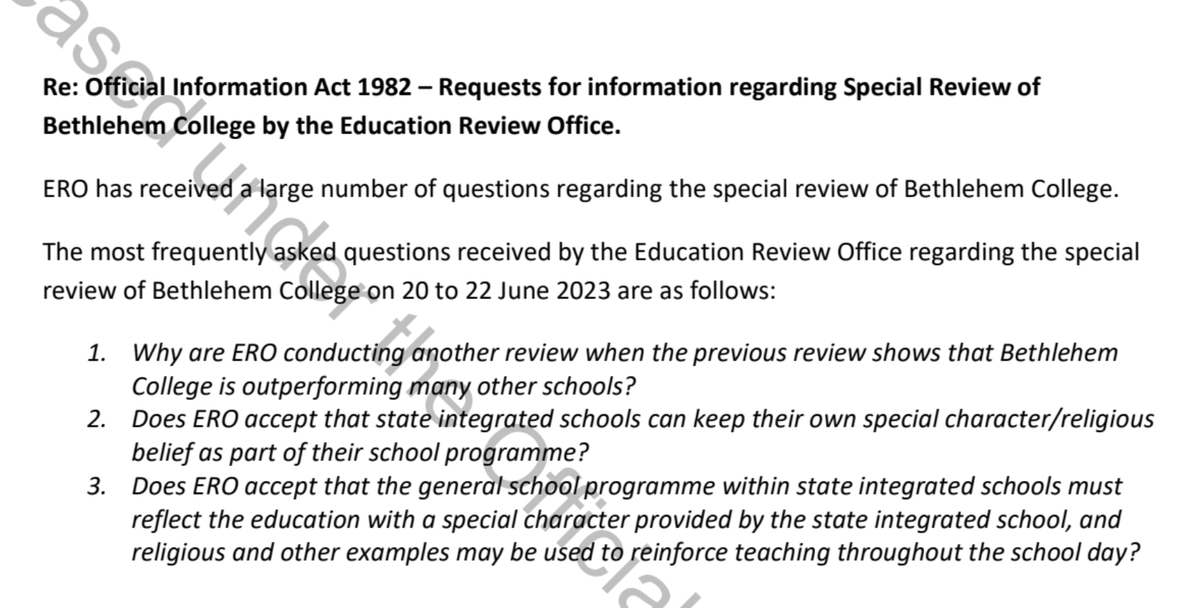The Education Review Office Finally Speaks on Bethlehem College. Sort of.
"ERO has received a large number of questions regarding the special review of Bethlehem College..."

Hi,
Today the Education Review Office decided to get back to me. While they did not answer any of the questions I’d laid out, they did give me a “proactive release of a recent OIA”.
From what I can tell, it appears to be in response to the ERO being hammered by Bethlehem College enthusiasts upset that the school is being investigated.
It’s telling.
You can view the original document here, but I’ve copied it below for your convenience. They had this back in June — but had neglected to tell me, despite my regular questions.
Better late than never, I guess?
David.
Re: Official Information Act 1982 – Requests for information regarding Special Review of Bethlehem College by the Education Review Office.
ERO has received a large number of questions regarding the special review of Bethlehem College.
The most frequently asked questions received by the Education Review Office regarding the special review of Bethlehem College on 20 to 22 June 2023 are as follows:
- Why are ERO conducting another review when the previous review shows that Bethlehem College is outperforming many other schools?
- Does ERO accept that state integrated schools can keep their own special character/religious belief as part of their school programme?
- Does ERO accept that the general school programme within state integrated schools must reflect the education with a special character provided by the state integrated school, and religious and other examples may be used to reinforce teaching throughout the school day?
In respect of Question 1, Bethlehem College was onboarded as part of ERO’s regular school review approach. During the early phases of this work ERO was made aware of the statements made by the principal and the board in relation to Clause 13 of the appendix to the school’s Statement of Beliefs.
At that same time a number of complaints were also made in respect of homophobic treatment experienced by current and former students. While the school has chosen to remove Clause 13 from its Statement of Beliefs, it has confirmed that these beliefs remain central to the school’s special character.
As a consequence, ERO expanded its focus for the review to include:
- an assessment of the school’s policies, systems, and procedures – in particular, the extent to which these accommodate and protect the rights of all learners at the school,
- the schools’ systems and practices in respect of types of bullying and provision of anti-bullying programmes, including homophobic and transgender bullying,
- an assessment of learning programmes, including the delivery of relationship and sexuality curriculum,
- interviews and focus group discussions with current students,
- how well the school has managed complaints from former students and their families,
- a review of stand downs, suspensions, expulsions and exclusions policy and procedures for recent years, and how these have been implemented,
- an assessment of teacher registration processes,
- an analysis of the results of the NZCER student survey that the school shared with its community.
ERO’s efforts have placed an emphasis on understanding the extent to which the school is providing for the emotional and physical safety of students and has pastoral care practices and systems appropriate to protecting and supporting the needs of all students, including LGBTQIA+ learners.
While ERO collected and sighted extensive documentation in respect of the operations of the school, this material is insufficient in identifying accommodations by the school towards students who may not conform with the school’s stated beliefs.
Consequently, I informed the presiding member that ERO would carry out a special review under section 463 of the Education and Training Act 2020 to make a judgement on whether the school is taking all reasonable steps to ensure that all students, including LGBTQIA+ students, are physically and emotionally safe and are adequately provided for through polices, systems, guidance, staff training and practices within the school.
Core to this was ensuring that ERO has sufficient evidence to form our judgement with regard to the above matters and that the school be given the opportunity to demonstrate their progress in strengthening their pastoral care systems. ERO visited the school between 20 and 22 June 2023 to gather this information. A final report will be publicly released in due course.
In relation to questions 2 and 3, ERO acknowledges the obligation on proprietors to maintain the special character of the school, and the right to hold these beliefs. At the same time Section 127 of the Education and Training Act 2020 requires the College board to ensure that the school is a physically and emotionally safe place for all students and staff, and New Zealand Bill of Rights Act 1990, and the Human Rights Act 1993 as a primary objective.
The college’s board is equally required to take all reasonable steps to eliminate racism, stigma, bullying and any other forms of discrimination within the school and that it is inclusive of and caters for students with differing needs.
These requirements includes the National Education and Learning Priorities issued under section 5 of the Education and Training Act 2020, which also require the school to sustain the identities, languages, and cultures of their learners. It is ERO’s interpretation that these obligations on the College board under section 127 of the Education and Training Act 2020 have greater prominence than the commitments entered through the Deed of Integration or Schedule 6 of the Education and Training Act 2020.
The function for ERO is to provide assurance to the school, wider community and the Minister that these obligations are delivered through the policies, systems, staff guidance, training and the practices of the school.
Equally, as a state integrated school the requirements of the New Zealand Curriculum are that curriculum delivery promotes inclusion through being non-sexist, non-racist, and non-discriminatory; and that students will respect themselves, others, and human rights.
The Code of Professional Responsibility and Standards for the Teaching Profession (Teaching Council of Aotearoa New Zealand) requires that all teachers have a commitment to learners that includes promoting the wellbeing of learners and protecting them from harm, promoting inclusive practices, and being fair and effectively managing their assumptions and personal beliefs.
ERO recognises that many faith-based special character schools are navigating these tensions and they are not unique to Bethlehem College. There are, however, examples of practice in faith based integrated schools which can be looked to and we understand that Associated Proprietors of Independent Schools can provide guidance in this regard.
Ngā mihi
Nicholas Pole
Te Tumu Whakarae mō te Arotake Mātauranga/ Chief Executive and Chief Review Officer
David here again. The main bits that stood out to me:
- “A number of complaints were also made in respect of homophobic treatment experienced by current and former students. While the school has chosen to remove Clause 13 from its Statement of Beliefs, it has confirmed that these beliefs remain central to the school’s special character.”
- “ERO’s efforts have placed an emphasis on understanding the extent to which the school is providing for the emotional and physical safety of students and has pastoral care practices and systems appropriate to protecting and supporting the needs of all students, including LGBTQIA+ learners.”
- “While ERO collected and sighted extensive documentation in respect of the operations of the school, this material is insufficient in identifying accommodations by the school towards students who may not conform with the school’s stated beliefs.”
- “ERO acknowledges the obligation on proprietors to maintain the special character of the school, and the right to hold these beliefs. At the same time Section 127 of the Education and Training Act 2020 requires the College board to ensure that the school is a physically and emotionally safe place for all students and staff, and New Zealand Bill of Rights Act 1990, and the Human Rights Act 1993 as a primary objective.”
I don’t imagine the BC top dogs are particularly happy with any of this.
I will keep updating this story. You can always reach me in confidence at davidfarrier@protonmail.com.
David.




